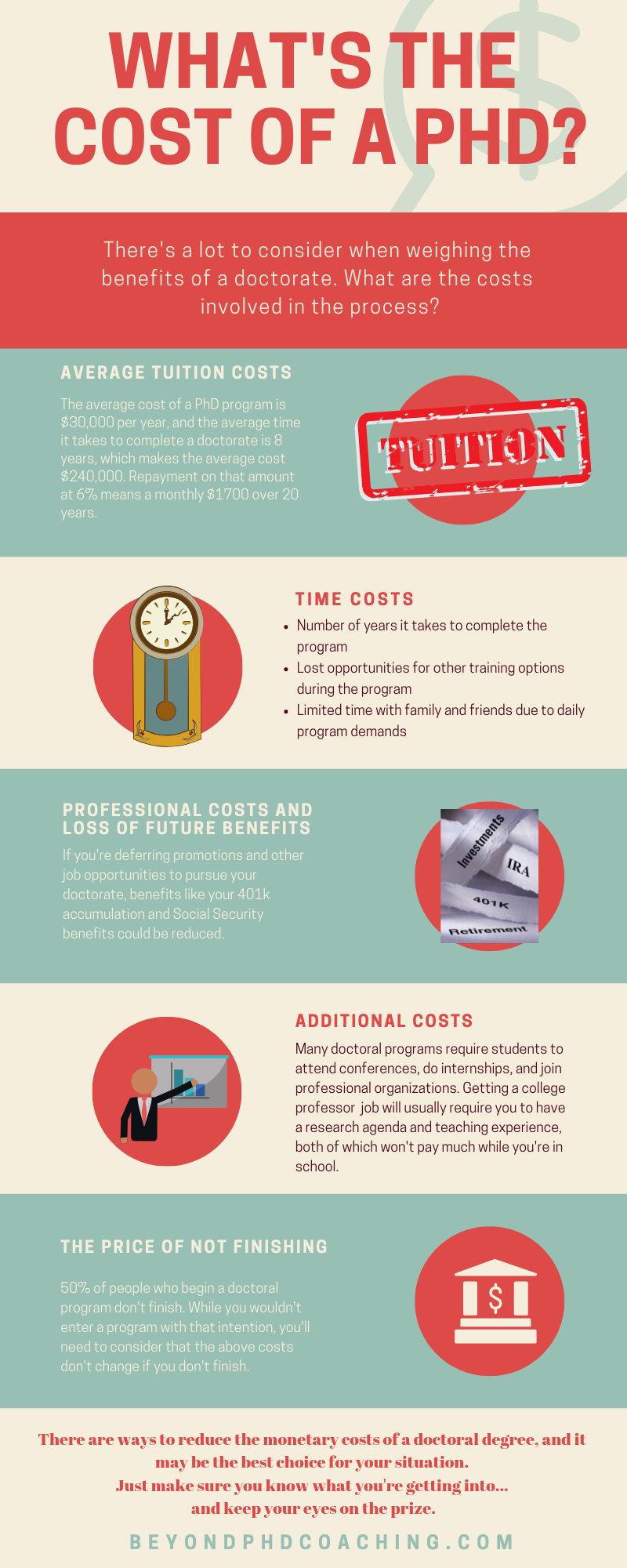Last Updated on: 6th June 2024, 01:36 am
Many people have dreams of getting a PhD and returning to the classroom to guide young students. Others want to complete a doctorate to embark on a career of cutting-edge research.
These are admirable reasons to embark on the road towards getting a PhD. However, it’s important to consider the cost of a PhD before embarking on this journey. How much does a PhD cost? And more importantly, is it worth the price?

Share this Image On Your Site
Average Cost of a PhD
The average time it takes to complete a PhD is just over 8 years. That’s right, 8 years. The average cost of a PhD program is $30,000 per year, which comes to a grand total of $240,000 over the course of eight years. Almost a quarter of a million dollars.
Of course, this is just the average cost of a PhD–chances are your specific program will cost either more or less, and you might not take as long to finish. Then again, you might take longer. So, these are just estimates. You may be able to come up with a more accurate estimate by looking at your specific program and field. But no matter the details, it is vital to consider how much money you’ll actually be spending and whether it’s worth the investment.
However, when considering the cost of a PhD, tuition is just the beginning. If you only look at the price tag without considering the hidden costs, you may be in for a rough few years. In order to fully answer the question, “How much does a PhD cost,” we have to look at some other factors as well.
The Hidden Cost of a PhD
There are more costs than just dollars and cents when pursuing anything, and a PhD is no exception. Here are some of the hidden costs to be aware of when considering the cost of a PhD.
Time
Eight years is a long time. Even three years is a substantial time investment. Getting a doctoral degree means that you will be investing a great deal of time into this quest. Before you begin, remember that you can only be in one place at a time so you will inevitably miss out on other opportunities. What do you spend your time on now? Consider whether you’re willing to give that up for the most part for a few years.
Lost/Delayed Opportunities

If you go to graduate school full-time you most likely will not be able to hold down a full-time job. That means that your career will be put on hold. If you go to graduate school part-time you can still keep your job but the demands of graduate school may mean that you might miss potential promotions.
Missed time with family and friends
The demands of a graduate program are substantial. There are classes and then there is homework. It is not like in undergraduate school where you might have been able to dash off a homework assignment 15 minutes before class. In graduate school you are expected to provide thoughtful and considered submissions. This can take a great deal of time.
This time commitment may mean missing events with your family and friends. I have seen many cases where a graduate student attends a soccer game or dance recital with her/his laptop and works on an assignment through the entire event. They are there, but are they really present? Make sure that your family is on board with you getting your degree. Their support can be invaluable, but their lack of support could mean having to pay back debt for a degree you never finished, or worse yet, resentment from those you love the most.
Income you could have had
If you do give up a career, you will lose that income. If you maintain your career, you may miss out on promotions and larger raises. This means lower income while in school. Recognize that there is no guarantee you will make this income back once you finish your degree. Depending on your field of study, you may actually make less money as a professor than you could at a professional job outside academia.
Foregone future benefits
You may have a number of benefits at work. For example, a 401(k) with employer matching. If you are not working, you will lose both your contribution and any employer matches. If your income is diminished, your 401(k) contributions may be lower. This will not impact your current income but it may reduce your retirement income.
The cost of not finishing
While your intention will obviously be to complete the program and get hooded at the end of the journey, the reality for 50% of those beginning a doctorate don’t finish. If you end up among them, will you regret beginning the program? How will you repay the student loans?
Is It Worth It to Get a PhD? Benefits of a Doctorate Program

With all of those costs, there must be some reasons people go through the mental and financial hardship of getting a PhD. And of course there are. Here are a few.
Positive income
On the bright side, at many schools PhD students go to school tuition free (at this point, tuition waivers are not considered income for tax purposes) and get small stipends to teach and help do research. This benefit can offset many of the costs, but you will find that these stipends do not allow for a lavish lifestyle. Many people in this position take out loans to cover living expenses.
Non-monetary benefits
If your ultimate career includes a full-time faculty job, then one of the benefits is a flexible schedule. Rarely do teaching faculty have to comply to a strict 9 to 5 schedule. Additionally, they get time off when students get time off. A flexible schedule can allow you to be more present in other areas of life, such as with your family. As a professor, I took the summers to spend time with family and explore the world. We bicycled through Northern France one summer and traveled to the Galapagos Islands another. These are experiences that I’ll always cherish.
There are also non-monetary benefits relating to creating a life of meaning. If you feel a sense of purpose in your job, you’ll have a happier daily existence than if you toil away at something that feels pointless. Since people with more education often get more control over their careers, the doctorate may enable more opportunities to find or create meaningful work.
Your getting a PhD might also be meaningful to those who know and love you. Will it serve your family or community to get a doctorate? How might your personal sacrifices be worth the effort, once you have achieved this goal on behalf of those you care about?
How Much Does a PhD Cost? Final Thoughts
The dream of getting a PhD drives many to enroll before considering all of the costs. I urge you to consider all possible costs and benefits when considering a PhD program. If you decide to enroll in a PhD program, consider options that can help you finish your degree faster, saving you money in the long run.
Asking the question, “How much does a PhD Cost” should always be followed by a second question: “Why do I want to get a PhD?” It’s important to consider the amount of money you’d be spending and consider whether it’s worth the investment. What else could you do with a quarter million dollars? Start a business? Buy a home? Feed the hungry?
Your reasons for getting a PhD are where you’ll find the answer to whether it’s worth the cost. If you’re confident your research could contribute to advances in developing a cure for cancer and you want to contribute what you can no matter the cost, it may be worth spending the money to get a PhD. If you’re deeply passionate about a certain subject and feel it’s your life purpose to ignite the same passion in young minds, getting a PhD may be the perfect choice for you.
But if you’re doing it to get a promotion or a better job, you might be better off looking into other options. In these cases, a PhD may not be worth the cost.
 Waiting to Get Your Dissertation Accepted?
Waiting to Get Your Dissertation Accepted?


